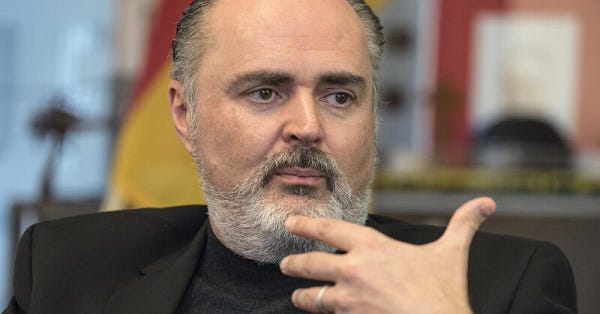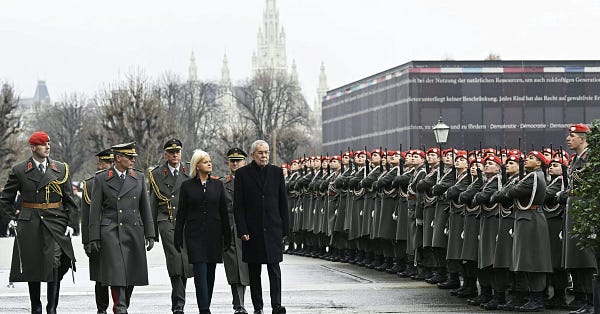Put Up Or Shut Up
After regional elections in Carinthia did not go as the party had hoped, the SPÖ is once again talking about who should be its leader

Servus!
The winner of the election was also its loser. On Sunday, voters in Carinthia went to the polls to elect a new state parliament. Austria’s southernmost state has long been a Social Democratic Party (SPÖ) heartland and a well of support for the far-right Freedom Party (FPÖ), Jörg Haider being a son of Carinthia who governed the state for a decade. The SPÖ has held the governorship of Carinthia since 2013, and the question was to what extent the party could uphold the 47.94 percent of the vote they won in 2018 when faced with a sea of troubles at the national level.
The good news for the SPÖ is that they remain the largest party in Carinthia. The bad news is their share of the vote fell by more than nine points to 38.92 percent. The FPÖ experienced a small bump in support, coming second on 24.55 percent. In particular, it was interesting in see how well the FPÖ did in areas with perceptively low levels of COVID-19 vaccine take-up. The biggest surprise was that the ÖVP, whose vote had been projected to collapse, ended up also experiencing a slight increase in their share of the vote, coming third ahead of the local populist party Team Kärnten led by former SPÖ man Gerhard Köfer.


Governor Peter Kaiser will remain on in his post in spite of the result and will likely look to continue his existing coalition with the ÖVP, though the SPÖ’s losses and ÖVP’s relative gain will tip the balance of power in the latter’s favor. The only possible alternative, in so far as I can tell, would be a three-party blocking coalition consisting of the FPÖ, ÖVP, and Team Kärnten, united by the prospect of keeping the dominant local SPÖ out of power. It is one thing to oppose, of course, and quite another to govern, and I cannot see these three parties uniting around a common candidate for the governorship, let alone a coherent governing agenda.


The SPÖ’s nine-point loss in Carinthia immediately brought the focus back to the great unanswered question at the heart of the national party in Vienna: Who leads? The result forced SPÖ leader Pamela Rendi-Wagner into a defensive position, once more fighting for her political life. She told the ORF Monday night she wasn’t giving up and stressed the need for party unity, condemning the “harassing fire” coming from Burgenland and its governor, her stalking horse Hans Peter Doskozil who has made no secret of his political ambitions. Doskozil declined to comment Tuesday on Rendi-Wagner’s “public attacks.” On Wednesday, she invited him to a meeting of the party’s national executive committee.


As I’ve said before in this newsletter, internal divisions are undermining the SPÖ and its leadership question has to be addressed sooner rather than later, ideally as soon as possible after state elections in Salzburg at the end of April. Comrades attacking each other in public, with SPÖ Vorarlberg leader Gabriele Sprickler-Falschlunger accusing Doskozil after Sunday’s vote of “hiding in Burgenland” and “not being man enough” to take on Rendi-Wagner openly, for example, cannot be allowed to go on. The SPÖ has already fallen from a high of 29 percent in national polling in September to 24 percent this month, and with each act of friendly fire the party seems doomed to lose another percentage point.
How can this situation resolve itself? Perhaps at an extraordinary party conference organized after the Salzburg election at which, after some campaigning, the leadership question would be put to delegates: Rendi-Wanger or Doskozil? She has the backing of the Vienna Party and the SPÖ’s women’s movement, and thus he would have to look to the states, in particular Lower Austria, for support; the trade union movement is divided. A Doskozil win would not be out of the question—recall that Bruno Kreisky became SPÖ leader in 1967 against the wishes of Vienna and the unions—but Rendi-Wanger’s institutional backing is formidable. The risks of a leadership contest are obvious, but party unity would be the ultimate reward.
Bis bald!
Thank you for subscribing to the Vienna Briefing. If you know someone who might also be interested in receiving this newsletter, consider sharing it with them today.
The Vienna Briefing is a free newsletter. If you enjoy and would like to support my work, think about sending me a tip via PayPal. Thank you to all those who have contributed.



Talks Break Down
Coalition negotiations between the SPÖ and ÖVP in the state of Lower Austria are on the verge of collapse. The ÖVP lost its absolute majority in January’s elections and needs a coalition partner in order to govern.
Bye Bye, TV License
Austria’s television license, the GIS, is to be replaced by a household levy beginning next year. The levy is intended to close the loophole by which people who don’t own a television can watch, listen to, or read publicly-funded ORF content online for free.
The Power Of Books
Leading figures in the far-right FPÖ are calling for a ban on Drag Queen Story Hours, at which drag queens read books to children, on child protection grounds. Far-right activists disrupted a Drag Queen Story Hour in Vienna in June.


